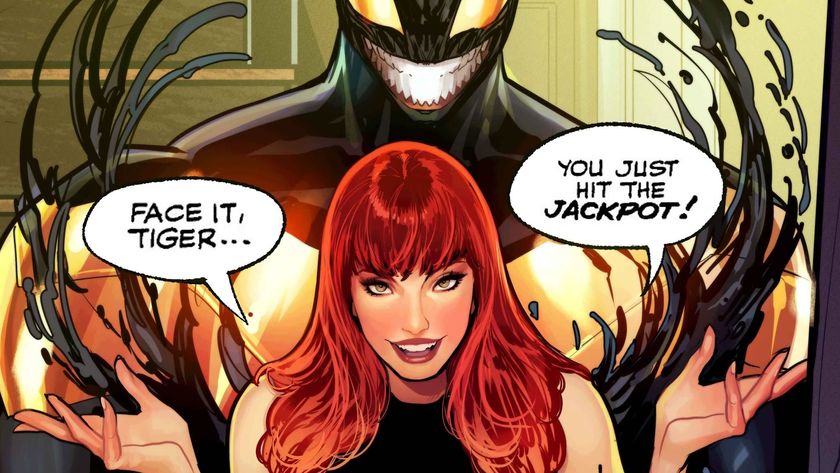How Loki grew out of being a villain with Journey Into Mystery
Journey Into Mystery: The Loki that was
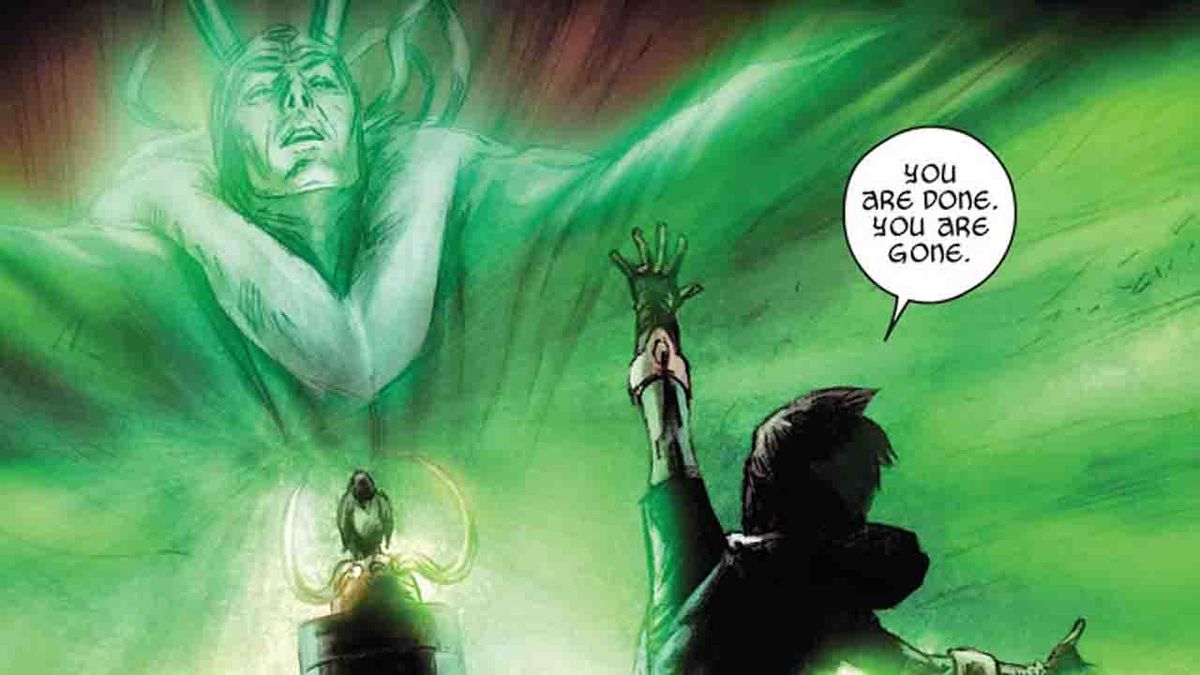
"Why do people always presume I'm lying?"
Once upon a time, Loki died. It was of course all part of (one of) the trickster god's plans. Death and eventual rebirth are key parts of comic book storytelling; especially so for Thor and the Ten Realms, considering Norse mythological inspirations like the cycle of Ragnarök. Things die so they can begin again, as they were.
So, when Loki died in 2010's Siege and was resurrected shortly after in a child's body, it is somewhat understandable that Asgardians were distrustful of the young boy despite his desire to change. Even Thor vouching for this Kid Loki wasn't enough for them to change their minds.
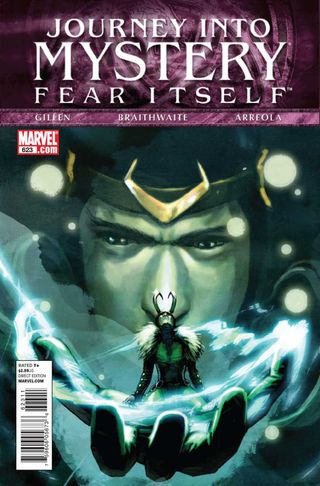
To them, this new body is less of a fresh start than the next chapter of an ongoing story. As a result, the Kieron Gillen-written Journey into Mystery is not solely concerned with the young Laufeyson's determination to prove he could change, but also if others would even allow him to. It certainly doesn't aid him that the actions of the former Loki follow wherever he goes. (This is not solely a metaphor, mind you – a magpie named Ikol houses the spirit of the former and accompanies Kid Loki on his journey).
Gillen's narrative advocates for the necessity of change, especially in the case of a person trying to better themselves, in addition to acknowledging just how hard it is to craft a new narrative for oneself when it is entangled in the stories of others. Just as the previous trickster died in Siege, a line-wide Marvel event, the run's first arc starts in the background of another – Fear Itself.
The Serpent, Odin's long-lost brother, has come to Earth to spread fear. Odin believes that he'll surely head to Asgard after to take the throne and is none too pleased about this prospect. He's fully prepared to lead his people out of Midgard, raising the Earth in his wake, to prevent that and he won't listen to reason, nor Thor. What this makes for is a big Marvel Universe story, with numerous tie-ins running alongside the main book, the scope of all this allowing Kid Loki the perfect opportunity to sneak away in order to start proving himself.
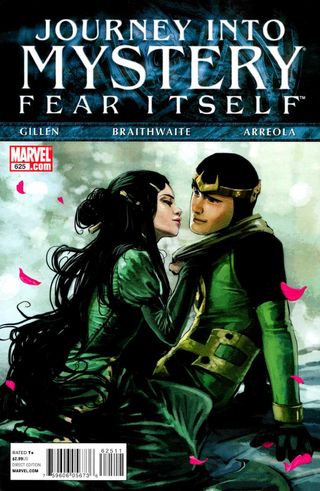
His scheming in the run is largely built around putting himself into the middle of the fray, resolute that he'll find a way out, even as the repercussions of his actions continue to build. He starts out by jumping headfirst into the territorial conflict between Mephisto, Hela, and their respective Hell and Hel. Kid Loki bounces between the locales in order to play them off against one another in the hopes of forming a momentary truce before a servant of the Serpent is able to implore either ruler to stand with his master.
Comic deals, prizes and latest news
Get the best comic news, insights, opinions, analysis and more!
He's playing by his old tricks, but even when others distrust him, the childish appearances grant him a few extra moments before they realize the extent of his manipulations, like when he even manages to find an opportunity to sit down with said servant. They talk, but it's purely a means of distraction so another can get close enough to slit the servant's throat.
Of course, playing two beings as powerful as Mephisto and Hela against each other so they end up in positions of admitting their weaknesses is sure to have a ripple effect, but at least for the minute, this brokering of peace allows him a way to travel to Limbo. It's there where Surtur is brought into the fold who, for the small promise of being allowed to destroy Asgard, gives the shadow of the Twilight Sword to the boy. Kid Loki certainly doesn't make it easy on himself, does he? Even his means of getting to Limbo are predicated on tricking the Hel Wolf who helped him get to Hell into dying, who them immediately argues that dying terminates their agreement and gives chase.
Though for as much as Kid Loki is capable of manipulating, there are some things he can't change. While he can use the happy coincidence of the Serpent's Dark Asgard as a way of fulfilling his promise to Surtur, a prophecy states that Thor will defeat the Serpent, only to fall himself. Using Surtur gift's – the sword's shadow is a quill – he's able to rewrite the Serpent's story to include a moment of weakness into the villain's past. Which ensures Thor's victory, but also his death. Leaving Kid Loki without the one person who has vouched for his goodness. It makes for a grim reminder for the run going forward, suggesting that even when things are changed for the purposes of good, a price has to be paid. A story cannot just be pulled out of thin air, it has to come from something.
The void left behind by his brother Thor is partially filled by the presence of Leah, Hela's left-hand woman. At one point, she remarks on the similarity of her name's anagram basis like with Ikol, deeming them both pets of egotistical masters, but she gradually becomes more endeared to Kid Loki. Journey into Mystery is ostensibly the story of the young boy, but Gillen ensures the character study is bolstered by parallels like this throughout the narrative.
One of these comes in Journey Into Mystery #630 with Volstagg returning to his family in the wake of Thor's death and choosing to spin a yarn that takes liberties with what actually happened. Rewriting what happened in part to delight his children with tales of thrilling heroics, but also in order to cope himself. This single-issue interlude also offers an idea of what it is to be good, which is to say being present and available for the ones you care about.
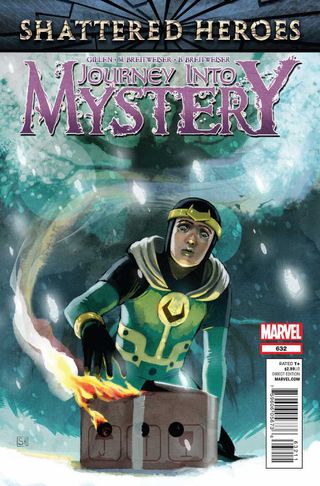
Another such story, in Journey Into Mystery #632, stems from unforeseen circumstances with the Hel Wolf again, who found the time to mate while Loki was occupied in Hell, and whose partner has bequeathed the resulting litter to the boy. Loki and Leah are able to find new homes for most of the pups, but the last one appears too abrasive to endear themselves to a willing home. Others, like the All-Mother, presume the dog cannot change and would be better of being disposed of, however, Loki remains steadfast in the belief that little Thori, as he calls him, can change. After all, it would be rude to believe that for himself and not extend the same courtesy to others.
The All-Mother also seems to think similarly about the young Loki, even his adoptive mother Freyja. "Think better of us", she says, "and we will think better of you." Yet they force him to operate in the shadows, thinking he's nothing more than what he once was, blackmailing him in response to learning the boy freed Surtur. From whom, you ask? Mephisto is the answer, not just to this, but also for how the events of the run continue to snowball as he provokes Nightmare into wreaking havoc on the minds of children across the world.
Nightmare is harvesting the residual fear – left behind from The Serpent's attack – in order to create a crown with which he can rule over the other Lords of Fear. Loki just so happens to have a lot of fear in his head for Nightmare to harvest. Even thematically, everything in the run extends from where the boy finds himself; this time through that classic coming-of-age idea of worrying who we'll become. Daimon Hellstrom's already on the trail, but when it leads him to Kid Loki, he attacks instantaneously, just one more person assuming the boy is the same as he ever was, despite being the Son of Satan and having had to escape the name of his forbearer himself.
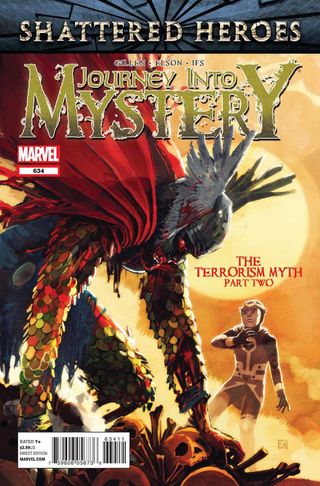
As with the situation in Hell, Loki's solution to the issue at hand is to put himself in the thick of it. He hands over his fear to Nightmare, giving him exactly what the villain wants, only this results in further political dispute when the other Lords of Fear learn what's going on. Another stalemate arises, though Loki also gains the begrudging respect of Hellstrom. Damion might not see a change in the trickery that the former Loki utilized, but he does see the efforts of the current iteration to employ it for good, which is more than most Asgardians can.
They were already distrustful of him, but certainly get more aggressive about it when the consequences of Loki's actions come home to roost in Everything Burns, a crossover between Loki's Journey into Mystery with The Mighty Thor ongoing series. Again, Kid Loki finds himself entangled in a story bigger than himself, but unlike Journey Into Mystery/New Mutants: Exiled, this is an outright Asgardian tale. The World Tree starts burning and the realm of Vanaheim aligns itself with Surtur in order to receive war machines.
Suffice to say, they're not pleased, but to Kid Loki's credit, he doesn't relish the way that the consequences have spiraled. His poor choices were for the best reasons. He still wants to put things right, only instead of putting temporary band-aids on these problems, this time, he attempts to tie everything together. As with Fear Itself, his actions occur in the background of the grand battle unfolding.
What's different this time is he accepts that he must do things as Loki once would, meaning that he doesn't just go between Hela and Surtur, but also plays the Warriors Three against one another, as well as 'betraying' Thor in order to achieve the desired outcome. That last one is more tricky than the others, as it is necessary to get his brother in position to fight Surtur when the opportunity arises, though the victory ultimately comes down to Thor utilizing trickery too, instead of a display of brute strength, by bringing Odin back into the fold in order to contain the energy expelled in Surtur's defeat.
And so, Asgard lived to see another day. All was well…
…well, except for that little matter of the Nightmare Crown. The one thing Loki couldn't tie up and which has found its way onto Mephisto's head. How, you ask? As with many questions of this series, the answer is Loki. Just as death was part of the plan, so too is the matter of rebirth. He wanted the ability to change but didn't want to actually put the work in that could achieve that. The final issue of the run sees the young boy confronting this final repercussion of his actions, himself, and his former self.
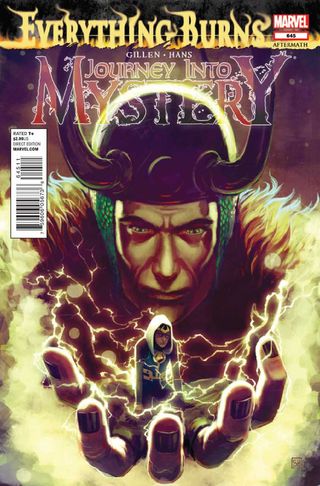
The original gives the child a choice: continue to be, thus allowing Mephisto to take the throne of fear, or let him have his body back, which will cause the crown to disappear as a result of the fears that created it no longer existing. These final scenes render the entire run as a tragedy, both in terms of the former Loki's puppeteering and Kid Loki's cascading actions, leading to this moment. Throughout the run, Kid Loki's efforts to be better at every turn have been evident, even when so many around him have refused to see that or expect to him operate as he once did. In the end, the only one who really allowed him to change was the trickster god himself.
In his final moment, Kid Loki makes the ultimately good choice of sacrificing himself for everyone else. Which is maybe the purest, most sincere form of goodness that one can practice. For others who might never know what he's done for them, even Thor and Leah, who has to lie through omission to. Though unlike the cycle that brought him into this world, this is the end of his story. The price for telling it is his existence, but at the same time, because it is a story, we readers know that it happened and that cannot be taken away or erased.
Make sure you've read the best Loki stories of all time.
Matt Sibley is a comics critic with Best Shots at Newsarama, who has contributed to the site for many years. Since 2016 in fact.

